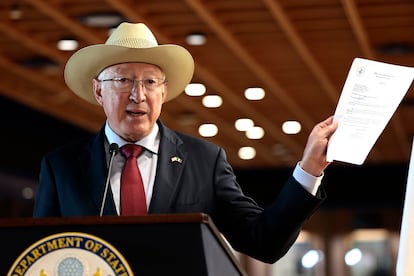Mexico’s questions over El Mayo’s capture are testing the patience of the United States
Ambassador Salazar rebuffs complaints from Sheinbaum’s administration regarding Washington’s lack of transparency on Zambada’s capture, presenting a detailed timeline of high-level communications

“What happened in Sinaloa should be celebrated.” That’s how U.S. Ambassador Ken Salazar responded to the latest wave of questions from Mexico regarding the lack of information surrounding the capture of Ismael “El Mayo” Zambada.
During a press conference on Tuesday, Salazar outlined a timeline of high-level communications between the two governments since the arrest of the notorious drug lord, who landed near the border city of El Paso on July 25. However, he left unanswered the questions raised by Mexico’s Attorney General Alejandro Gertz earlier that day, specifically regarding the identity of the pilot of the plane, why this individual wasn’t arrested, and how a “cloned” aircraft was allowed to enter U.S. territory.
Once again, Mexico and Washington find themselves at odds over conflicting narratives surrounding the downfall of the co-founder and leader of the Sinaloa Cartel.
“The United States has provided us with part of the information, but an essential part is still missing,” said Manero in his first public appearance in months.
Three months after Zambada’s arrest, Mexican authorities now believe that Ismael “El Mayo” Zambada was betrayed and handed over by his godson, Joaquín “El Güero” Guzmán López, the son of Joaquín “El Chapo” Guzmán.
“The kidnapping is proven,” said Gertz, head of the Attorney General’s Office (FGR), indicating that Guzmán López is the main suspect.
Missing from the puzzle, however, are the details surrounding the plane’s arrival in the United States and what American officials knew of Guzmán López’s plans to turn himself in and betray Zambada.
In response, Ambassador Salazar presented at least five letters from senior U.S. officials to their Mexican counterparts on the ongoing investigation. He explained that communications began the day of the arrest with a message from U.S. Attorney General Merrick Garland to Gertz, followed by a call between the two officials two days later.
A week after El Mayo’s arrest, the FBI’s deputy director met with the head of the FGR to discuss the details of the case. Garland later sent another letter on August 16. “High-level drug traffickers generally do not turn themselves in unless they feel pressured to do so,” Salazar read from the letter sent by Garland. “Your efforts to capture and extradite [El Chapo’s son] Ovidio Guzmán and Nestor Isidro Perez Salas [head of security for Los Chapitos] have kept the pressure on the cartel’s leaders,” continued the letter, which congratulated Mexican authorities. “The surrender of Joaquín Guzmán López is a victory for both countries.”
Salazar’s message focused on the “victory” of El Mayo’s capture rather than address the criticisms about the lack of transparency.
“The events were the result of the conflict between criminal groups and the immense pressure that the Mexican authorities, with the support of the United States, have exerted on the cartel figures in recent years,” wrote U.S. Secretary of State Anthony Blinken to Mexico’s then foreign minister, Alicia Bárcena, in a letter sent on August 19, which was read aloud by Salazar.
Nevertheless, there are still questions about Washington’s version of events. In the letter, Blinken assured Bárcena that the United States did not conduct an operation on Mexican soil to apprehend Zambada and that the pilot was neither an “employee, contractor, nor a U.S. citizen.” This was the official stance issued by the White House on August 10, just one day before El Mayo published a letter accusing his former allies of betrayal — Mexican authorities’ primary line of inquiry.
When pressed by reporters about the pilot’s identity and why he wasn’t detained, Salazar, visibly frustrated, reiterated, “It was not our plane or our pilot. It cannot be said more clearly.”
During the briefing, the ambassador praised Mexico’s new president, Claudia Sheinbaum, as “a champion of the bilateral relationship,” though he acknowledged the strain of recent diplomatic tensions. “Saying that there is no problem and that if there is a problem, [it is someone else’s fault] is not right,” Salazar remarked, alluding to Sheinbaum’s comments about the U.S.’ responsibility for escalating violence and cartel conflict in Sinaloa following Zambada’s capture. Salazar’s statements included other pointed remarks like, “We respect and expect respect,” and, “Respect is earned with respect.”
Amid these frictions and the upcoming U.S. presidential election on November 5, Salazar clarified that the U.S. will remain steadfast in addressing drug trafficking, migration, and other sensitive issues. “Without security, there is no prosperity,” he concluded.
Sign up for our weekly newsletter to get more English-language news coverage from EL PAÍS USA Edition
Tu suscripción se está usando en otro dispositivo
¿Quieres añadir otro usuario a tu suscripción?
Si continúas leyendo en este dispositivo, no se podrá leer en el otro.
FlechaTu suscripción se está usando en otro dispositivo y solo puedes acceder a EL PAÍS desde un dispositivo a la vez.
Si quieres compartir tu cuenta, cambia tu suscripción a la modalidad Premium, así podrás añadir otro usuario. Cada uno accederá con su propia cuenta de email, lo que os permitirá personalizar vuestra experiencia en EL PAÍS.
¿Tienes una suscripción de empresa? Accede aquí para contratar más cuentas.
En el caso de no saber quién está usando tu cuenta, te recomendamos cambiar tu contraseña aquí.
Si decides continuar compartiendo tu cuenta, este mensaje se mostrará en tu dispositivo y en el de la otra persona que está usando tu cuenta de forma indefinida, afectando a tu experiencia de lectura. Puedes consultar aquí los términos y condiciones de la suscripción digital.









































